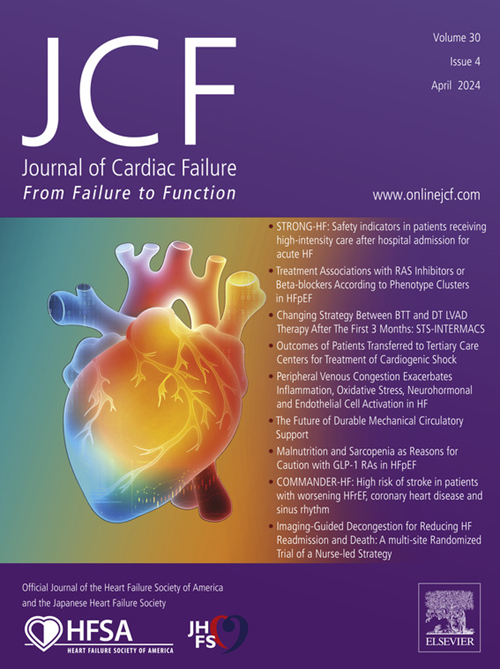治疗心力衰竭的处方模式及其与再入院的关系:回顾性分析。
IF 6.7
2区 医学
Q1 CARDIAC & CARDIOVASCULAR SYSTEMS
引用次数: 0
摘要
背景:AHA/ACC/HFSA 最近在 RAASi、β-受体阻滞剂和 MRAs 的基础上增加了 SGLT2i,形成了指导性医疗疗法(GDMT)的四大支柱,用于治疗射血分数降低的心力衰竭(HFrEF)。尽管有强有力的证据表明,住院病人开始使用目标剂量的 GDMT 可改善预后,但在处方实践中却发现了明显的滞后现象:目的:研究 HFrEF 患者出院时的 GDMT 处方率,并评估其与各种患者特征和全因再入院率的关系:我们使用心衰协作组织(HFC)的改良版评分将患者分为两组(HFC评分结果为 "GDMT "的患者和 "GDMT "评分结果为 "GDMT "的患者):在符合条件的患者中,β-受体阻滞剂的处方率为 77.9%,RAASi 为 70.3%,MRAs 为 41%。此外,萨库比特利/缬沙坦的处方率为 27.7%,SGLT2i 为 17%。只有1%的患者HFC评分为9分(所有4类药物均达到目标剂量)。黑人患者、在教学服务机构入院的患者和以 HfrEF 为主要入院原因的患者出院时 HFC ≥ 3 的可能性更大。HFC≥3与较低的1个月所有原因再入院率有关:与之前的研究一致,我们的数据显示,HFrEF 患者的 GDMT 处方存在很大差距。应进一步开展实施研究,以改善住院期间的 GDMT 处方。本文章由计算机程序翻译,如有差异,请以英文原文为准。

Prescription Patterns in Management of Heart Failure and Its Association With Readmissions: A Retrospective Analysis
Background
The American Heart Association/American College of Cardiology/Heart Failure Society of America recently added sodium-glucose cotransporter-2 inhibitors in addition to renin–angiotensin–aldosterone system inhibitors, beta-blockers, and mineralocorticoid receptor antagonists to form the 4 pillars of guideline-directed medical therapy (GDMT) for the management of heart failure with reduced ejection fraction (HFrEF). Despite strong evidence suggesting improved outcomes with inpatient initiation of GDMT at target doses, significant lag has been noted in prescription practices. We sought to study GDMT prescription rates in patients with HFrEF at the time of hospital discharge and evaluate its association with various patient characteristics and all-cause readmission rates.
Methods and Results
We used a modified version of Heart Failure Collaboratory (HFC) score to characterize patients into 2 groups (those with an HFC score of <3 and an HFC score of ≥3) and to examine various socioeconomic and biomedical factors affecting GDMT prescription practices. Out of the eligible patients, the prescription rates for beta-blockers was 77.9%, renin–angiotensin–aldosterone system inhibitor was 70.3%, and mineralocorticoid receptor antagonists was 41%. Furthermore, prescription rates for sacubitril/valsartan was 27.7% and sodium-glucose cotransporter-2 inhibitors was 17%. Only 1% of patients had an HFC score of 9 (drugs from all 4 classes at target doses). Patients of black ethnicity, those admitted on teaching service and those with HFrEF as the primary cause of admission were more likely to have an HFC of ≥3 at discharge. An HFC of ≥3 was associated with lower rates of 1-month all-cause readmissions.
Conclusions
Consistent with the prior research, our data show significant gaps in prescription of GDMT in HFrEF. Further implementation research should be done to improve GDMT prescription during inpatient stay.
求助全文
通过发布文献求助,成功后即可免费获取论文全文。
去求助
来源期刊

Journal of Cardiac Failure
医学-心血管系统
CiteScore
7.80
自引率
8.30%
发文量
653
审稿时长
21 days
期刊介绍:
Journal of Cardiac Failure publishes original, peer-reviewed communications of scientific excellence and review articles on clinical research, basic human studies, animal studies, and bench research with potential clinical applications to heart failure - pathogenesis, etiology, epidemiology, pathophysiological mechanisms, assessment, prevention, and treatment.
 求助内容:
求助内容: 应助结果提醒方式:
应助结果提醒方式:


